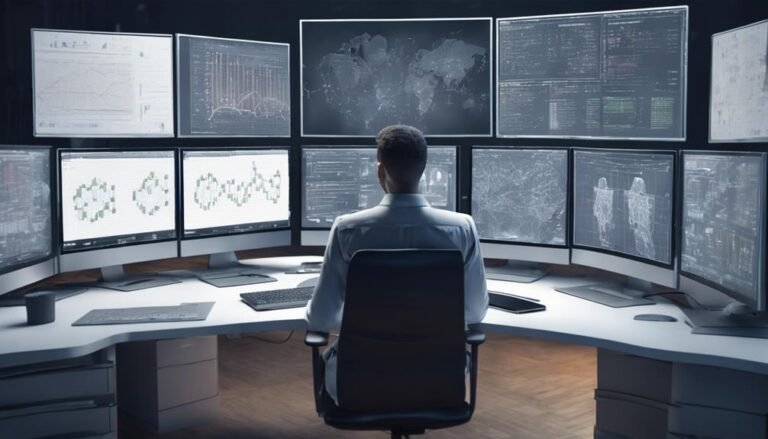Job Description for Security Officer
A security officer's job involves maintaining vigilance, critical resolution skills, physical fitness, crisis management, and exceptional customer service. Key skills include understanding security protocols, effective communication, attention to detail, and conflict resolution. Required qualifications call for proficiency in essential security skills and conflict management. Training and certification cover decision-making simulations, interactive modules, and scenario-based exercises. Knowledge of security equipment, emergency response protocols, communication, and career growth opportunities are vital for success. Discover more about the detailed job expectations and advancement prospects in the security officer role.
Key Takeaways
- Maintain a vigilant presence for safety and security.
- Possess critical resolution skills for handling emergencies.
- Provide exceptional customer service to stakeholders.
- Demonstrate crisis management abilities in challenging situations.
- Uphold physical fitness for swift patrolling and responses.
Duties and Responsibilities
In the role of a security officer, the primary duty is to uphold a vigilant presence and guarantee the safety and security of the premises. This entails a combination of critical resolution skills, physical fitness, crisis management abilities, and exceptional customer service. Security officers must be prepared to handle various situations that may arise, from diffusing conflicts between individuals to responding to emergencies swiftly and effectively.
Conflict resolution is an essential aspect of a security officer's responsibilities, requiring the ability to de-escalate tense situations and ensure a peaceful resolution. Physical fitness is necessary for security officers as they may need to patrol large areas on foot, respond quickly to incidents, or detain individuals if necessary. Crisis management skills are essential to assess and address threats promptly to minimize harm to individuals and property. Additionally, providing excellent customer service is crucial as security officers often interact with the public, employees, and stakeholders, representing the organization they work for.
Key Skills and Abilities
An effective security officer must possess a range of essential skills and abilities to guarantee the safety and security of the premises they protect. Understanding the nuances of security protocols, being able to communicate effectively, and having a keen eye for detail are critical aspects of the role.
Additionally, undergoing specialized training programs is essential to equip security officers with the necessary knowledge and expertise to handle various security challenges effectively.
Essential Security Skills
Possessing a diverse set of technical and interpersonal proficiencies is imperative for individuals aspiring to excel in the role of a Security Officer. Security skills encompass a combination of physical fitness, problem-solving skills, attention to detail, and conflict resolution abilities. Here is a breakdown of the essential security skills required:
| Security Skills | Description |
|---|---|
| Physical Fitness | Ability to respond swiftly and effectively in physically demanding situations. |
| Problem Solving Skills | Capacity to analyze complex situations and devise effective solutions. |
| Attention to Detail | Attentiveness to identify and address potential security threats accurately. |
| Conflict Resolution Skills | Skill in de-escalating conflicts and handling confrontations peacefully. |
| Communication Skills | Proficiency in conveying information clearly and collaborating with team members. |
Required Training Programs
To complement the essential security skills discussed previously, a thorough training program is necessary to equip Security Officers with the key skills and abilities required for effective performance in their role.
Training programs should include hands-on simulations, interactive modules, practical exercises, and scenario-based training to prepare Security Officers for real-world situations.
Hands-on simulations allow officers to apply theoretical knowledge in a controlled environment, enhancing their decision-making and response capabilities.
Interactive modules facilitate engagement and knowledge retention, ensuring that officers understand security protocols thoroughly.
Practical exercises provide opportunities for officers to practice their skills in realistic settings, improving their readiness and efficiency.
Scenario-based training exposes officers to various security threats, enabling them to develop critical thinking and problem-solving skills essential for the role.
Required Qualifications
To excel as a Security Officer, possessing essential skills and meeting training requirements are crucial. These qualifications guarantee that the officer can effectively carry out their duties in maintaining security and safety.
Essential Skills
Demonstrating proficiency in essential security skills is a critical requirement for individuals aspiring to become a Security Officer. Key skills include conflict resolution and team collaboration.
Security Officers must possess the ability to effectively manage and de-escalate conflicts that may arise in their assigned areas. This involves remaining calm under pressure, actively listening to all parties involved, and finding solutions that prioritize safety and security.
Additionally, strong team collaboration skills are crucial as Security Officers often work alongside other security personnel, as well as with management and external authorities. Effective communication and the ability to work cohesively within a team are essential for ensuring a coordinated and efficient security operation.
Training Requirements
An in-depth understanding of security protocols and procedures is a fundamental prerequisite for individuals seeking to meet the training requirements and qualifications necessary to become a Security Officer.
Training requirements for Security Officers typically encompass a thorough curriculum covering areas such as emergency response, surveillance techniques, report writing, and legal aspects of security.
Additionally, many employers require Security Officers to undergo specific certification processes to make certain they are well-equipped to handle various security challenges effectively. These certifications often involve both theoretical coursework and practical training to simulate real-world security scenarios.
Training and Certification
How essential is training and certification for individuals aspiring to become security officers? Training programs and certification requirements play an important role in preparing security officers to handle various situations effectively. Here are three key aspects to take into account:
- Certification Requirements: Obtaining proper certification showcases a security officer's commitment to professionalism and competence in the field. It guarantees that the officer has met the necessary standards set by regulatory bodies, giving employers confidence in their abilities.
- Training Programs: Thorough training programs equip security officers with the knowledge and skills required to perform their duties efficiently. These programs cover a broad range of topics such as emergency response procedures, conflict resolution techniques, and legal regulations, preparing officers for real-world scenarios they may encounter on the job.
- Continuing Education: Continuous learning through advanced training courses and workshops is vital for security officers to stay updated on industry best practices, new technologies, and evolving security threats. This ongoing education helps officers adapt to changing environments and enhances their overall effectiveness in safeguarding people and property.
Security Equipment Knowledge
A deep understanding of security equipment is essential for security officers to effectively safeguard premises and individuals under their protection. Security officers must possess thorough knowledge of equipment maintenance and security technology to guarantee the proper functioning of surveillance systems and alarm systems. Proficiency in maintaining security equipment is vital for preventing system failures that could jeopardize the safety of the premise and its occupants.
Security officers should be well-versed in the operation and troubleshooting of surveillance systems to monitor activities and identify potential security threats proactively. In-depth knowledge of alarm systems is indispensable for prompt responses to security breaches or emergencies. Understanding security technology enables officers to leverage advanced features effectively, enhancing overall security measures.
Emergency Response Protocols
Security officers must be well-trained in implementing effective emergency response protocols to swiftly address security breaches or crises within a premises. To guarantee a prompt and coordinated response, security officers should adhere to the following procedures:
- Conduct Regular Emergency Drills: Security officers should participate in frequent emergency drills to practice their response to various scenarios. These drills help familiarize the team with emergency protocols, identify areas for improvement, and enhance overall preparedness for real-life situations.
- Establish Clear Crisis Management Protocols: It is essential to have well-defined crisis management protocols in place, outlining roles and responsibilities for each team member during an emergency. Clear communication channels, designated assembly points, and steps for escalating situations should be established to facilitate a coordinated response.
- Continuously Evaluate and Improve Protocols: Emergency response protocols should be regularly reviewed and updated based on feedback from drills, lessons learned from past incidents, and changes in security risks. Continuous improvement ensures that security officers are equipped to handle emergencies effectively and efficiently.
Communication and Reporting
During critical incidents, effective communication and detailed reporting are vital for security officers to guarantee swift and accurate response coordination. Security officers must possess strong communication skills to relay information clearly and concisely to team members, law enforcement, and other relevant parties during emergencies. Clear communication ensures that everyone is on the same page, leading to a coordinated and efficient response to any security threats.
Additionally, security officers are responsible for accurate incident reporting. This includes documenting all relevant details of an incident, such as the time, location, individuals involved, and actions taken. Detailed incident reports are essential for investigations, legal purposes, and identifying areas for improvement in security protocols. Security officers must pay close attention to detail when writing reports to ensure accuracy and completeness.
Career Growth Opportunities
To advance in the field of security officer roles, professionals should strategically pursue opportunities for career growth and development. In the domain of security, career advancement and professional development are essential for staying competitive and enhancing one's skills.
Here are three key avenues for security officers to explore in order to progress in their careers:
- Specialized Training Programs: Enrolling in specialized training courses such as cybersecurity, crisis management, or physical security can equip security officers with advanced skills and knowledge, making them more valuable assets to their organizations.
- Seeking Advanced Certifications: Obtaining certifications like Certified Protection Professional (CPP), Physical Security Professional (PSP), or Certified Information Systems Security Professional (CISSP) can significantly enhance a security officer's credibility and open doors to higher-level positions.
- Networking and Mentorship: Building a strong professional network within the security industry and seeking mentorship from seasoned professionals can provide valuable insights, guidance, and potential opportunities for career growth.
Conclusion
To sum up, the job description for a security officer entails a range of duties and responsibilities, requiring key skills, qualifications, and training. Understanding security equipment, emergency response protocols, and effective communication is essential.
Opportunities for career growth exist within this field, allowing individuals to advance their skills and knowledge. For example, a security officer who successfully implements a new security protocol that reduces incidents by 50% can showcase their strategic thinking and problem-solving abilities.







